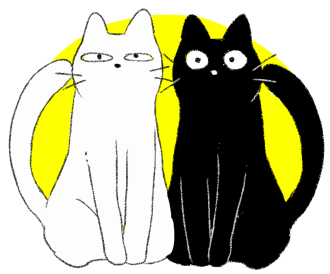let's talk about dissociative identity disorder, a heavily stigmatized disorder that lacks the care and attention it needs !

an informative carrd by tianyu ! a DID system
with help from miriam, another DID system
WARNING: due to the nature of this disorder, this carrd will delve into topics such as trauma, csa, and abuse. there are no graphic descriptions or imagery, but it will be mentioned. please proceed with caution and stay educated.
.
what is DID ?
dissociative identity disorder— formerly and outdatedly known as multiple personality disorder —is a dissociative disorder based on the existence of two or more "altered states of consciousness" called alters / parts / headmates that have the ability to take executive control, followed by memory gaps or amnesia.
why isn't it called MPD ?
to refer to DID as MPD suggests that alters are split off personalities of the host. this is not true by any means. alters are often completely different from their host, and don't represent them in any shape or form; alters can be a different gender, species, race, or sexuality from their host.
wait— what's dissociation ?
good question ! dissociation is a wide variety of experiences that ranges from mild to severe detachment of one's physical or emotional experience. some common cases of dissociation involve but are not limited to disconnection from reality / thoughts / actions / surroundings, memory loss, depersonalization, derealization, and disengagement. dissociation can be regarded as a coping or defense mechanism in seeking to handle, minimize, or tolerate stress.
dissociation isn't only an occurrence with DID! it can be a symptom of other disorders such as BPD, PTSD, other dissociation and depersonalization disorders!
.
what causes DID ?
child abuse / csa mention !!
DID is more of a self-defense mechanism than it is a disorder or illness. it stems from repeated or long-term childhood trauma and is almost always related to complex ptsd (c-ptsd). it has been studied that DID cannot manifest after ages 6-9 due to people having an integrated sense of self after this period. however, later-occurring trauma can lead to more alters "coming forward" even after the initial integration.
DID is most commonly caused by betrayal trauma, which occurs when the people that a child depends for survival significantly violates their trust or well-being; an example of this is physical, emotional, or sexual abuse of a child by the hands of their caregiver.
however! DID isn't inherently caused by direct abuse; growing up in unstable conditions such as warzones, repeated natural disasters, medical trauma, and human trafficking can contribute to DID.
introduction to alters
alters are dissociated parts of a system that can take executive control of the body, or "front" (not all alters will front, some can front continuously while others never will). each alter has their own perception of self and do not view themselves as only a fragment or "split personality" of the host. alters often express themselves or behave differently and/or possess varying skills and abilities such as higher pain tolerance than the host. they can have different ages, genders, sexualities, appearances, and species from the host / body. it's important to know that, even if theyre nonhuman, alters are no different than you and me; they have wants, opinions, and voices to be listened to. they should be respected just as the host is, even if you're unfamiliar to them. communication is key, and there's no reason to be unkind to alters.
roles + vocabulary
the body (n) — the physical body that the system inhabits.
fronting (v) — being in control of the body and able to interact with the world and/or other people.
switching (v) — an alter taking control of the body
host (n) — the alter who fronts the most. hosts are in charge of most aspects of daily life.
protector (n) — alters who protect the body / host / other alters / etc through emotional, verbal, or physical means, amongst others.
persecutors (n) — alters who harm the body / host / other alters / etc. persecutors often possess the peak of the host's trauma, acting out as means of self-defense or a negative outlet. please note that persecutors are not evil, don't treat them as such
it's important to know that not all alters will have a role.
.
OSDD-1a and OSDD-1b
other specified dissociative disorder (OSDD) is a catch-all for symptoms that don't fit within other dissociative disorder diagnostics. this disorder has a subtype called OSDD-1 that's very similar to DID but not quite there yet and is split into two other parts called OSDD-1a and OSDD-1b (this is really confusing I know and I'm sorry); OSDD-1a refers to dissociated parts that don't really qualify as alters while OSDD-1b refers to those who do have alters but no amnesia between switches. some people with OSDD-1 don't experience amnesia or distinct parts, others have distinct parts but don't often or ever experience switches.
co-consciousness
it's normal for someone to black out and lose track of time during a switch. sometimes systems will develop the ability for two or more alters to be simultaneously present in the body or have awareness of the outside world. co-conscious (or co-con) alters may have varying degrees of control over the body— they might not even be aware of each other's thoughts and feelings to a certain level. co-con can occur more often in some systems than others. sometimes it takes years of work and communication while other times it happens frequently to the point of very little blackouts / amnesia happening at all.
.
inner worlds
alters don't just float around in someone's brain aimlessly. more often than not, systems will have an inner world where their alters are able to manifest and interact with one another. some systems will have alters who interact in one room, while others will have an entire house, apartment complex or neighborhood. interaction between alters is very common, some may even pursue relationships with one another. hosts themselves may even be perceived differently in the inner world. however, inner worlds don't completely mirror reality; if an alter is harmed within the inner world, no real damage is taken to the body.
interaction with alters
when interacting with fronting alters, it's important to know that they're not an extension of the host; also, while this is a given, they have their own feelings and thought processes and sometimes they'll even have triggers— please respect all these factors. also note that not all alters are keen on interaction. please don't take it personally if an alter doesn't talk to you or isn't super friendly. sometimes alters will imitate the host, so you might be unaware that they're fronting unless they let you know directly. keep in mind that an alter being triggered to come to front isn't always negative, nor is it always for prolonged periods of time! someone mentioning an alter's interest can cause them to front, as well as other mundane occurrences like their favorite meal being cooked. other times, alters front when the host is in danger or distress. switches range from slow to rapid, they can last as long as a few minutes to hours.
.
FAQ
can alters die? — nope ! they can go into dormancy (something akin to a comatose state) or integrate, but it's impossible for them to "die".
can DID form in adults? — while alters can come forward in adulthood, DID itself cannot form in adults, as adults have a fully integrated personality while developing children do not. though, someone might only realize the existence of their system in adulthood; this is a completely normal occurrence for many systems.
what if an alter has a different race than the host? — it's not uncommon for an alter's race to be different from the body's! however, even if an alter is a different race from their body in the inner system, they cannot claim that race when fronting, or reclaim slurs that the body can't reclaim.
are persecutors dangerous? — no alter is dangerous or evil, media such as Psycho or Split twists DID into a narrative that is both completely incorrect and harmful to systems. while persecutors can come off as unfriendly / rude / hateful, it's important to understand that there's always reasoning behind their behavior. please do not antagonize or berate persecutors.
,
thank you for reading !!

DID is often stigmatized, so it's important to know the realities of it. every experience is different, every alter and system is different. there is no representative of how systems should be, every experience is valid.
for more info, check out these sexy resources ! here! and here!
.